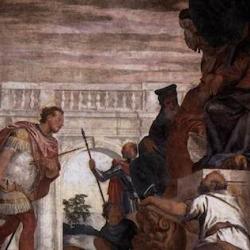In an article on Revelation, J. Daryl Charles observes that the Roman Empire “had brought about the ‘solution’ – ‘salvation’ for the human race – and was thus worthy of popular adoration. Empire-adoration necessitated a personal symbol which the ancient city-state could not generate. In the Imperial cult resided the token of Imperial unity. The Empire was in effect a politico-ecclesiastical institution, a ‘church’ as well as a state, not unlike its Eastern antecedents” (90).
He elaborates: “the notions of Imperium (the right of authority), potestas (efficacy, public authority) and majestas (sovereign authority) germinated not in the West but in the Orient. Though Imperium is a Latin term, the underlying concept is universal: the state as a single, universal society with a god-son on the throne. While a military commander, according to Roman custom, would assume the title of imperator following a victory in battle only after returning to the city, there is no genuine consensus among historians as to how this tradition developed; it remains somewhat obscure. Moreover, in the literature there is some disagreement as to whether the title was hereditary or not. Nevertheless, though Oriental in conception, Imperium achieved deep roots in its Roman manifestation” (90).
The spread of the imperial cult testifies to the “evangelical” impulse of the church of the empire: “From 3 B.C., at the formation of the Octavian-Antony-Lepidus triumvirate, until the time of Diocletian, eighty-three places of consecration/deification were erected in Rome, indicating the relative influence of the Imperial cult. Augustus, as the inscriptions show, was being worshipped in the East as ‘a Savior . . . through whom have come glad tidings.’ While it is true that Augustus never allowed himself to be openly designated a god and worship of Augustus in Rome and Italy was nominally forbidden, the poets of his age—Proportius, Virgil, Horace and Ovid—were lavish in their praise of him as Deus” (90-1).
Later empires followed his example: “Comparisons of Nero with Mithra and Tyche as described by Dio, with their ascription of supernatural qualities, are useful in illustrating how a Nero redivivus legend could flourish on a popular level. The Flavian emperors, successors to the Julian dynasty, generally sought legitimacy by assuming divine status” (91).
(Charles, “Imperial Pretensions and the Throne-Vision of the Lamb: Observations on the Function of Revelation 5,” Criswell Theological Review 7 [1993]: 85-97.)











